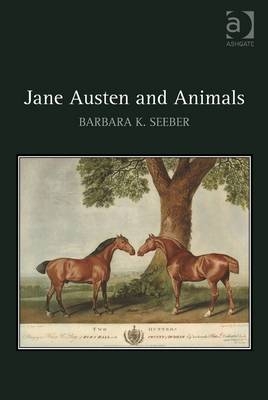
Jane Austen and Animals
Seiten
2013
Routledge (Verlag)
978-1-4094-5604-9 (ISBN)
Routledge (Verlag)
978-1-4094-5604-9 (ISBN)
In her study of animals in Jane Austen, Seeber situates the author's work within eighteenth- and nineteenth-century debates about human-animal relations. She shows that Austen associates the domination of animals with that of women, challenges readings that identify Austen's depictions of nature as benign celebrations of England's imperial power.
The first full-length study of animals in Jane Austen, Barbara K. Seeber’s book situates the author’s work within the serious debates about human-animal relations that began in the eighteenth century and continued into Austen’s lifetime. Seeber shows that Austen’s writings consistently align the objectification of nature with that of women and that Austen associates the hunting, shooting, racing, and consuming of animals with the domination of women. Austen’s complicated depictions of the use and abuse of nature also challenge postcolonial readings that interpret, for example, Fanny Price’s rejoicing in nature as a celebration of England’s imperial power. In Austen, hunting and the owning of animals are markers of station and a prerogative of power over others, while her representation of the hierarchy of food, where meat occupies top position, is identified with a human-nature dualism that objectifies not only nature, but also the women who are expected to serve food to men. In placing Austen’s texts in the context of animal-rights arguments that arose in the late eighteenth and early nineteenth centuries, Seeber expands our understanding of Austen’s participation in significant societal concerns and makes an important contribution to animal, gender, food, and empire studies in the nineteenth century.
The first full-length study of animals in Jane Austen, Barbara K. Seeber’s book situates the author’s work within the serious debates about human-animal relations that began in the eighteenth century and continued into Austen’s lifetime. Seeber shows that Austen’s writings consistently align the objectification of nature with that of women and that Austen associates the hunting, shooting, racing, and consuming of animals with the domination of women. Austen’s complicated depictions of the use and abuse of nature also challenge postcolonial readings that interpret, for example, Fanny Price’s rejoicing in nature as a celebration of England’s imperial power. In Austen, hunting and the owning of animals are markers of station and a prerogative of power over others, while her representation of the hierarchy of food, where meat occupies top position, is identified with a human-nature dualism that objectifies not only nature, but also the women who are expected to serve food to men. In placing Austen’s texts in the context of animal-rights arguments that arose in the late eighteenth and early nineteenth centuries, Seeber expands our understanding of Austen’s participation in significant societal concerns and makes an important contribution to animal, gender, food, and empire studies in the nineteenth century.
Barbara K. Seeber is Associate Professor of English at Brock University, Canada. She is the author of General Consent in Jane Austen: A Study of Dialogism (2000).
Preface, Barbara K. Seeber; Introduction: A Nest of My Own, Barbara K. Seeber; Chapter 1 The Animal Question and Women, Barbara K. Seeber; Chapter 2 Making a Hole in Her Heart, Barbara K. Seeber; Chapter 3 Too Cool about Sporting, Barbara K. Seeber; Chapter 4 Evergreen, Barbara K. Seeber; Chapter 5 Legacies and Diets, Barbara K. Seeber; Chapter 6 Rock and Rain, Barbara K. Seeber; Chapter 7 Conclusion, Barbara K. Seeber;
| Erscheint lt. Verlag | 4.7.2013 |
|---|---|
| Verlagsort | London |
| Sprache | englisch |
| Maße | 156 x 234 mm |
| Gewicht | 453 g |
| Themenwelt | Geschichte ► Teilgebiete der Geschichte ► Wirtschaftsgeschichte |
| Geisteswissenschaften ► Philosophie ► Ethik | |
| Geisteswissenschaften ► Sprach- / Literaturwissenschaft ► Anglistik / Amerikanistik | |
| Geisteswissenschaften ► Sprach- / Literaturwissenschaft ► Literaturgeschichte | |
| Geisteswissenschaften ► Sprach- / Literaturwissenschaft ► Literaturwissenschaft | |
| Studium ► 1. Studienabschnitt (Vorklinik) ► Med. Psychologie / Soziologie | |
| Naturwissenschaften | |
| Sozialwissenschaften ► Soziologie | |
| ISBN-10 | 1-4094-5604-8 / 1409456048 |
| ISBN-13 | 978-1-4094-5604-9 / 9781409456049 |
| Zustand | Neuware |
| Haben Sie eine Frage zum Produkt? |
Mehr entdecken
aus dem Bereich
aus dem Bereich
die Ukraine, Polen und der Irrweg in der russischen Geschichte
Buch | Hardcover (2023)
C.H.Beck (Verlag)
28,00 €
wie die USA und China um die technologische Vorherrschaft auf der …
Buch | Hardcover (2023)
Rowohlt (Verlag)
30,00 €


